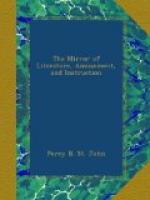F. Hemans: “the very hand—fair, small, and beautifully feminine—in which should be embodied her gentle breathings of household love, her songs of the domestic affections, and all her lays of silvery sweetness and soft-breathing tenderness.”
F. LEVESON Gower, the distinguished translator of Goethe’s Faust.
H. Brougham: “a good deal like his own style of oratory—impressive and energetic, but not very polished.” We question the last; but, be this as it may, polish is only desirable so long as it does not impair truth and utility. Plain-speaking has been the best rule of conduct for public men in all ages.
Basil Hall: the observant traveller and very ingenious writer.
John Wilson (the reputed editor of Blackwood’s Magazine); and beneath, F. Jeffrey (late editor of the Edinburgh Review), who took his seat in Parliament not many days since.—“These are two names which stand at the head of the periodical literature of Scotland. The periodical writer must have a ready command of his pen and a versatile genius; he must be able to pass quickly from one subject to another; and instead of devoting himself to one continuous train of thought, he must have a mind whose quick perception and comprehensive grasp enable him to grapple with a thousand. See how this applies to the handwriting of Jeffrey and of Wilson. The style of both signatures implies a quick and careless motion of the hand, as if the writer was working against time, and was much more anxious to get his ideas sent to the printer, than to cover his paper with elegant penmanship. There is an evident similarity in the fashion of the two hands—only Mr. Jeffrey, being much inferior to the Professor in point of physical size and strength, naturally enough delights in a pen with a finer point, and writes therefore a lighter and more scratchy hand than the author of ‘Lights and Shadows.’ It will add to the interest of Mr. Jeffrey’s autograph to know that, as his hand is not at all altered, we have preferred, as a matter of curiosity, to engrave a signature of his which is twenty-three years old, being taken from a letter bearing date 1806.”
W. Wordsworth: “a good hand, more worthy of the author of the best parts of ‘The Excursion,’ than of the puerilities of many of the Lyrical Ballads.”
DUGALD Stewart: “a hand worthy of a moral philosopher—large, distinct, and dignified.”
W. JERDAN: Editor of the Literary Gazette; free and facile as his vein of criticism, and one of the finest signatures in the page.
J. Baillie: “it will be perceived that it has less of the delicate feebleness of a lady’s writing than any of the others. It would have been sadly against our theory had the most powerful dramatic authoress which this country has produced, written like a boarding-school girl recently in her teens. This is decidedly not the case. There is something masculine and nervous in Miss Baillie’s signature; it is quite a hand in which ‘De Montfort’ might be written.”




